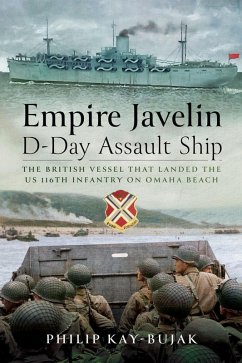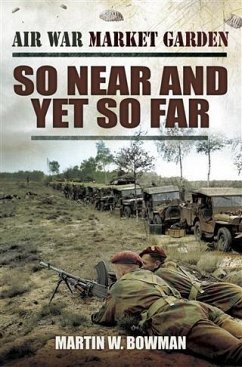
D-Day Assault (eBook, PDF)
Versandkostenfrei!
Sofort per Download lieferbar
13,95 €
inkl. MwSt.
Weitere Ausgaben:

PAYBACK Punkte
7 °P sammeln!
Preceded by a massive airborne assault, the largest amphibious operation ever undertaken began on 6 June 1944 - D-Day. Over a fifty-mile stretch of heavily-fortified French coastline 160,000 Allied troops came ashore on the beaches of Normandy. Supported by more than 5,000 ships and 13,000 aircraft, they quickly gained a foot-hold in Fortress Europe.To plan and execute such a massive military operation successfully required training. The stakes were high. There was one chance to see the landings work; failure was inconceivable. Much work was required to be done, new tactics to be worked out, n...
Preceded by a massive airborne assault, the largest amphibious operation ever undertaken began on 6 June 1944 - D-Day. Over a fifty-mile stretch of heavily-fortified French coastline 160,000 Allied troops came ashore on the beaches of Normandy. Supported by more than 5,000 ships and 13,000 aircraft, they quickly gained a foot-hold in Fortress Europe.To plan and execute such a massive military operation successfully required training. The stakes were high. There was one chance to see the landings work; failure was inconceivable. Much work was required to be done, new tactics to be worked out, new technologies to be utilised. Most of all, the training for the amphibious assault required beaches. Such locations would need to be as representative of the actual landing beaches as possible, large enough to support exercises up to divisional level and be able to safely allow the live firing of weapons both by the supporting naval and air forces as well as that of the assaulting troops.Such a place for the Americans was found in the sleepy South Hams area of South Devon. The long shingle beach at Slapton Sands featured a freshwater lake and inundated area just behind it. The rural countryside with rolling hills, de-lineated by high hedges and featuring numerous small woods bore a remarkable similarity to the area selected for the American landing area at Utah beach.But this choice came at a price. Over 20,000 acres of prime agricultural land, along with villages and farms were requisitioned. No less than 180 farms, 28 shops, 11 inns, 100 houses and 450 cottages, along with 3,000 residents, were expelled from the area. The peace of the South Devon coast was soon shattered as what came to be known as the Slapton Sands Assault Training Centre. Such was the scale of the training that almost all of the US troops involved in D-Day itself landed on the beach at Slapton Sands at one time, some more than once. The American airborne forces would also practice here, being dropped behind the beaches as part of the vast exercises - Incredibly realistic, always dangerous. The training, however, was not without risk. During one of the final major co-ordinated practices - Exercise Tiger - over 800 men were lost to enemy action whilst travelling by sea to land on the beaches at Slapton Sands. Often shrouded in intrigue, this disaster has been the subject of conspiracy theories for many years.Following D-Day, with the troops gone, the South Hams area fell silent once more. People returned to their homes to find farmland overgrown, shell-crated and damaged. Villages and houses had been battered by shell fire and the movements of thousands of troops. Live ammunition and the detritus of war lay scattered throughout the area.Packed with the first-hand accounts of those who lived or trained at Slapton Sands, the author, a military historian brought up in the area, investigates all aspects of the military exercises undertaken here.
Dieser Download kann aus rechtlichen Gründen nur mit Rechnungsadresse in A, B, BG, CY, CZ, D, DK, EW, E, FIN, F, GR, HR, H, IRL, I, LT, L, LR, M, NL, PL, P, R, S, SLO, SK ausgeliefert werden.













